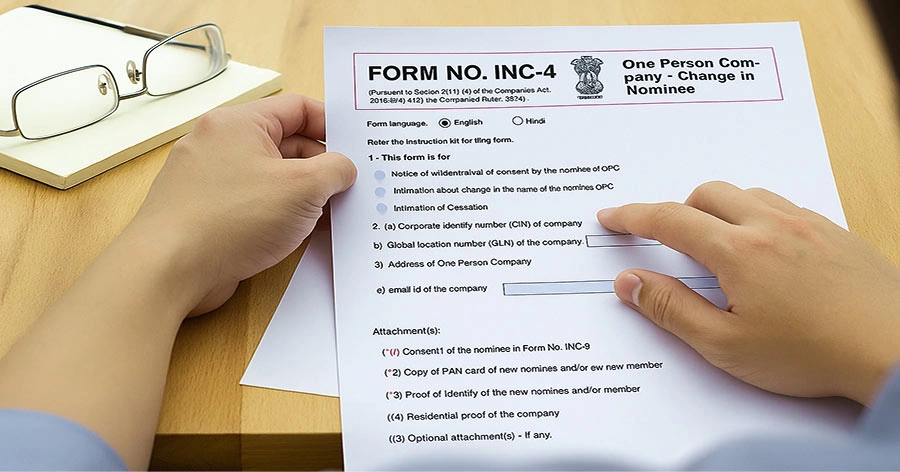
A new concept has been introduced in the Company’s Act 2013, about the One Person Company (OPC). In a Private Company, a minimum of 2 Directors and 2 Members are required whereas in a Public Company, a minimum of 3 Directors and a minimum of 7 members. A single person could not incorporate a Company previously.
One Person Company (OPC) is a company incorporated by a single person. Before the enforcement of the Companies Act, 2013, a single person could not establish a company. If an individual wanted to establish his business, he/she could opt only for a sole proprietorship as there had to be a minimum of two directors and two members to establish a company.
As per Section 2(62) of the Company’s Act 2013, a company can be formed with just 1 Director and 1 member. It is a form of a company where the compliance requirements are lesser than that of a private company.
The Companies Act, 2013 provides that an individual can form a company with one single member and one director. The director and member can be the same person. Thus, one person company means one individual who may be a resident or NRI can incorporate his/her business that has the features of a company and the benefits of a sole proprietorship.
Advantages Of OPC
Legal status
The OPC receives a separate legal entity status from the member. The separate legal entity of the OPC gives protection to the single individual who has incorporated it. The liability of the member is limited to his/her shares, and he/she is not personally liable for the loss of the company. Thus, the creditors can sue the OPC and not the member or director.
Easy to obtain funds
Since OPC is a private company, it is easy to go for fundraising through venture capitals, angel investors, incubators etc. The Banks and the Financial Institutions prefer to grant loans to a company rather than a proprietorship firm. Thus, it becomes easy to obtain funds.
Less compliances
The Companies Act, 2013 provides certain exemptions to the OPC with relation to compliances. The OPC need not prepare the cash flow statement. The company secretary need not sign the books of accounts and annual returns and be signed only by the director.
Easy incorporation
It is easy to incorporate OPC as only one member and one nominee is required for its incorporation. The member can be the director also. The minimum authorised capital for incorporating OPC is Rs.1 lakh but there is no minimum paid-up capital requirement. Thus, it is easy to incorporate as compared to the other forms of company.
Easy to manage
Since a single person can establish and run the OPC, it becomes easy to manage its affairs. It is easy to make decisions, and the decision-making process is quick. The ordinary and special resolutions can be passed by the member easily by entering them into the minute book and signed by the sole member. Thus, running and managing the company is easy as there won’t be any conflict or delay within the company.
Perpetual succession
The OPC has the feature of perpetual succession even when there is only one member. While incorporating the OPC, the single-member needs to appoint a nominee. Upon the member’s death, the nominee will run the company in the member’s place.
Disadvantages Of OPC
Suitable for only small business
OPC is suitable for small business structure. The maximum number of members the OPC can have is one at all times. More members or shareholders cannot be added to OPC to raise further capital. Thus, with the expansion and growth of the business, more members cannot be added.
Restriction of business activities
The OPC cannot carry out Non-Banking Financial Investment activities, including the investments in securities of anybody corporates. It cannot be converted to a company with charitable objects mentioned under Section 8 of the Companies Act, 2013.
Ownership and management
Since the sole member can also be the director of the company, there will not be a clear distinction between ownership and management. The sole member can take and approve all decisions. The line between ownership and control is blurred, which might result in unethical business practices.
A registered name for OPC
One Person Company is the Company which is incorporated by only one person. If you are thinking of incorporation of One Person Company, then you should also start thinking of its name. A unique name gives an introduction of your company to people. A unique name also shows what you work. A unique name is required for your company which should not be similar to other existing company.
How to Choose a Name of One Person Company?
So every company name should be in three parts. The first name is your company name. The second name is your object part, and the last one shows what type of your company. For example, Mayur clothing limited you can see that Mayur is a company name, clothing shows the object of the company and limited shows type of company.
So you have to think the unique first name, so it impresses people, and it should not be similar to other existing company. You can choose your object part for examples Technology, mobiles, food, medical, shipping, financial, travel, etc.
Your name will be valid when it registered under the Companies Act, 2013. If you are thinking of registration of your company name or incorporation of your company, then you have to comply with the naming guidelines under the Companies Act, 2013.
Naming Guidelines
You have to comply with the rules and regulation of companies act for registration of your valid name of the company. You have to meet with given below guidelines
• The name shall not be identical with or resemble too nearly to the name of existing company • The name shall not be undesirable in the opinion of the central law • The name shall not constitute an offense • The name shall not use any word which shows that it connected with government except approval from the government • Plural version of any of the words appearing in the name of an existing company doesn’t make a name unique. • The proposed name should not violate section 3 of the Emblems Act 1950. • The word “State” will only be allowed in the case of a government company. • If you are adding words like New, Modern, Shri, Sri, Shree, Om, Jai, Sai, The, etc. does not make a name unique. • If you are making a name with a different combination of the same word it does not make a unique name • You cannot use words like Rashtrapati, Republic, panchayat, municipal, minister, nation, governor except approval from the government.
Rejection of Name
• Name of OPC may be rejected in given below conditions • If the name is to general without any distinct word or identity • If it does not include the suitable prefix • Similar to other existing company • The proposed name resembles closely with the popular or abbreviated description of a current company • If the Proposed name is offensive for certain section of people • If the Proposed name includes the word “British India.” • If the Proposed name consists of the name of an enemy country • Your name can be rejected if other condition of valid surname not fulfilled
Application for Reservation of Name
You can apply for the application of reservation of name through online mode. You have to visit the official website of MCA where you can file your application. You have to fill the form INC-1.
There is Reserve unique name (RUN) web service available on MCA portal where you can Reserve a name for your One Person Company. An approved name is valid for 20 days from the date of approval (in case name is being reserved for a new company)
Frequently Asked Questions
Who is eligible to act as a member of an OPC?
Only a natural person who is an Indian citizen and resident in India shall be eligible to act as a member and nominee of an OPC. For the above purpose, the term “resident in India” means a person who has stayed in India for a period of not less than one hundred and eighty-two days during the immediately preceding one financial year.
A person can be a member of how many OPCs?
A person can be a member of only one OPC.
Is there any tax advantage on forming an OPC?
There is no specific tax advantage to an OPC over any other form. The tax rate is flat 30%, other tax provisions like MAT & Dividend Distribution Tax applies as they apply to any other form of company.
Is there any threshold limits for an OPC to mandatorily get converted into either a private or public company?
In case the paid-up share capital of an OPC exceeds fifty lakh rupees or its average annual turnover of immediately preceding three consecutive financial years exceeds two crore rupees, then the OPC has to mandatorily convert itself into a private or public company.
What is the mandatory compliance that an OPC needs to observe?
The basic mandatory compliance comprise:
- At least one Board Meeting in each half of the calendar year and the time gap between the two Board Meetings should not be less than 90 days.
- Maintenance of proper books of accounts.
- Statutory audit of Financial Statements.
- Filing of business income tax returns every year before 30th September.
- Filing of Financial Statements in Form AOC-4 and ROC Annual Return in Form MGT 7.
Who cannot form a One Person Company?
A minor, a foreign citizen, a Non-Resident, and any person incapacitated by contract will not be eligible to become a member.
How do I convert an OPC to a Private limited company?
Mandatory conversion of One Person Company (OPC) to Private Limited Company (PLC) is required in case a One Person Company meets certain parameters such as:
- The effective date of increase in the paid-up share capital of a One Person Capital is beyond 50 lakh, and
- An increase of average annual turnover during the period of immediately preceding three consecutive financial years is beyond 2 crore.
- In the above case, the One Person Company shall be mandatorily required to convert itself into either a private or a public company within a period of six months. In this article, we also look at the procedure for conversion of One Person Company into a private limited company or limited company.
What are the conditions for voluntary conversion of OPC to Private Limited Company?
When a One Person Company gets incorporated, it cannot convert itself to a Private or Public company before two years from the date of incorporation.
If the time period has elapsed and two years time period is over, a One Person Company can apply for converting itself to a Private Limited Company or a Public limited company.
The conversion process should be done as per the rules and regulations laid down by the Companies Act, 2013 under Section 18, and Rule 7(4) of the Companies (Incorporation) Rules, 2014.
MCA website also has few FAQs addressed on OPC. You can check this out by clicking the link below:




